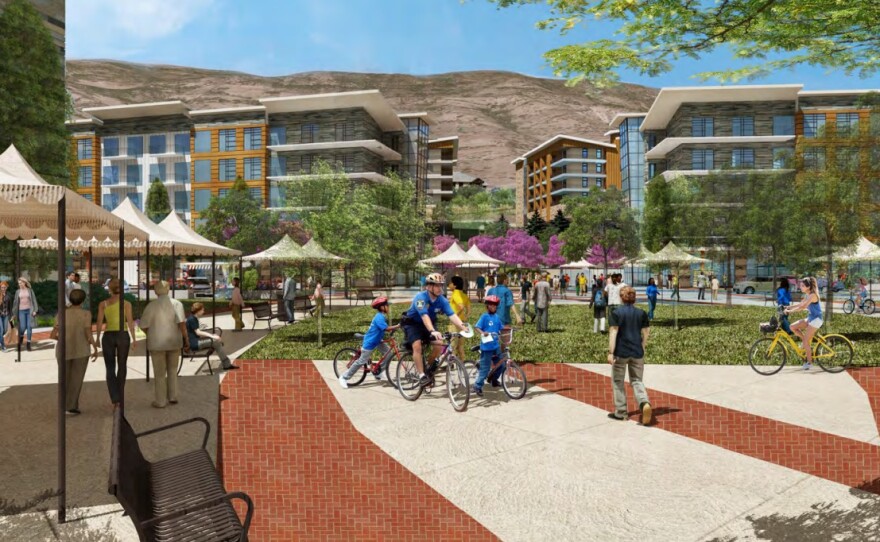The council voted 3-2 to annex almost 150 acres of county land into the city for a project in between the Utah Valley University extension and Wasatch Commons Apartments. That’ll bring 1,100 residential units, six commercial buildings, a church and potentially a school. The development also includes a town plaza, amphitheater and park.
Councilors Rachel Kahler and Heidi Franco voted no. While Kahler acknowledged the project can offer the city benefits, such as trails and public places, she said the plan is more dense than what the city previously told the county it would allow.
“I still think this is a lot,” Kahler said. “I think the density is still far exceeding what the initial plan was. 140 acres with over 1,100 units - that is going to bring traffic, that is going to bring an impact to our schools with no school in this area. I still think this is going to have a negative impact on this portion of our community.”
Developer Terry Diehl with Cardinal Financing said the company will negotiate with the school district if the board wants to build a school there. A 4-acre site for a church on the property is already under contract.
City planners advised the council to approve the development. That’s in part because it will add “quality neighborhoods,” gathering places, affordable housing and recreation sites, in line with the city’s general plan.
The approval included some changes by city staff. Those were to ensure the project’s public facilities are publicly owned and that money the city gets from certain fees will pay for development rights in the North Fields. The North Fields are roughly 2,800 acres west of Highway 40 and north of Midway Lane.
Funding those development rights tipped the scales for Councilor Ryan Stack, the deciding vote, who was also “uncomfortable” with the density.
“There’s a lot here that I’m willing to buy into solely because of the preservation fee,” he said. “For me, that is driving the vote with a lot of these annexation agreements, and certainly here with the Highlands. We are going to be receiving over $1.8 million, and that money can be combined with other preservation fees from future annexations, and more to the point, it can be leveraged with grants to preserve agriculture in the North Fields, or buy up development rights in the North Fields.”
He argued that whether the city annexed the property or let it remain part of the county, that hillside land would eventually be developed with high density. So, it’s in the city’s best interests to earn those fees.
Stack also pointed out some inconsistencies between designs and the master development agreement. So, he proposed a clause that if there are future conflicts, the developer has to follow what’s outlined in the agreement.
Along with disapproving of the development in general, Mayor-elect Franco didn’t want to leave those inconsistencies to deal with in the future.
She made a motion to set aside the vote for later and fix those details in the plan in the meantime. The motion failed without a second councilor’s support. The council next voted to approve the annexation.
“It never ceases to amaze me how we pass such major things without seeing the actual, final wording,” she said. “To me, that is really not a wise thing to do, for them as well as for us. I am very, very concerned about the density in this area. The density is amazing. It’s very amazing. That’s probably the best way to describe it, I’m sorry to say.”
Current Mayor Kelleen Potter told KPCW several developments in the area will change that zone north of the city significantly. Combined with the neighboring Coyote Lane homes already under construction and the New London proposal that could bring more homes and a Smith’s Marketplace, she says the city’s strategy is to cluster development there.
“It’s going to be busy. There’ll be several new intersections with lights. It will be a busy road. The notion is to create these centers, so that it won’t mean everyone has to get on that road to get everywhere, that there will be some commercial, there will be some schools, there will be some services in those areas, so it’s not going to require everyone getting on that road, but there’s definitely predictions of a lot of traffic coming in on 40,” Potter said.
The Heber City Council will meet once more in 2021 on Tuesday, December 21. It’ll be Potter’s final meeting as mayor before Franco takes over on Tuesday, January 4.
In the first meeting of 2022, Councilors-elect Scott Phillips and Yvonne Barney will also be sworn in, filling the seats of Franco and Councilor Wayne Hardman.














